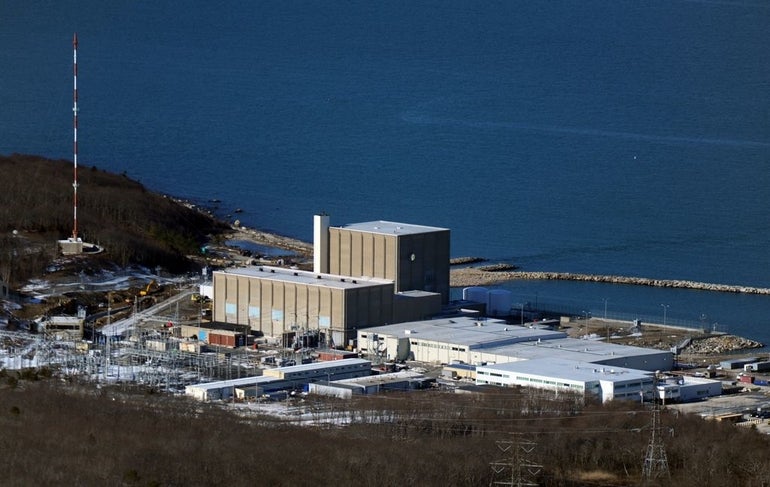Healey proposal would cut energy bill charges, reopen door to nuclear facilities
 Photo | WBJ File
Pilgrim Nuclear Power Station in Plymouth, which closed in 2019
Photo | WBJ File
Pilgrim Nuclear Power Station in Plymouth, which closed in 2019
Gov. Maura Healey proposed Tuesday to repeal a law put in place by voters as part of a worldwide nuclear freeze movement, a bid to open the door to greater deployment of newer nuclear energy facilities as part of a push to save ratepayers $10 billion over a decade.
The bill the governor unveiled Tuesday in Leominster would eliminate or reduce energy bill charges, make nuts-and-bolts changes to electricity procurement and supply practices, impose reforms to the competitive electric supply industry, and allow the state to "explore cutting edge nuclear technologies," the governor's office said.
Energy bills soared for many Bay Staters this winter, exacerbating chronic cost-of-living pressures for Massachusetts residents and businesses that already pay some of the highest energy prices in the country and calling attention to the state clean energy and climate mandates some say are driving elevated costs. Healey announced a series of executive actions in March designed to spur savings of nearly $6 billion over the next five years and shaved $50 off April electricity bills. She said Tuesday her new bill adds to those efforts.
"Here's what it's going to do: Number one, it's going to take charges off your bills. For too long, it's been the practice to add more charges onto your bills. We're going to start removing a bunch of those things. Two, we're going to expand that moderate income discount so that now gas customers will be able to get it in addition to our electric customers. And three, it's going to bring more energy into Massachusetts. More supply means lower prices," the governor said in Leominster. "I believe that this legislation is going to give us the tools that we need to create more accountability for our utilities and maximize every single ratepayer dollar."
Healey's office said the bill envisions "an all-of-the-above energy approach including nuclear," though not a return to facilities like Pilgrim Nuclear Power Station, the state's last nuclear plant which ceased operations in 2019.
"We're not talking about sort of your old school nuclear power plant. What we're talking about is cutting-edge, small-scale nuclear technology," Energy and Environmental Affairs Secretary Rebecca Tepper said.
Tepper's Executive Office of Energy and Environmental Affairs said proposed new nuclear fission facilities in Massachusetts face a barrier that no other energy generation source does: the requirement that it secure approval of a majority of voters through a statewide ballot initiative.
That requirement was put in place via the November 1982 ballot, when voters in eight states and several major cities called for a worldwide nuclear freeze a few years following the partial nuclear meltdown at the Three Mile Island plant in Pennsylvania and amid Cold War tensions, according to the New York Times.
Healey's energy bill would repeal that 1982 voter law. The administration pointed to a study from grid operator ISO New England that estimated that about 15 gigawatts of "small modular reactors" (SMRs) could help the New England states meet their 2050 decarbonization targets while requiring 57% less construction at 33% lower capital cost as compared to a scenario with no new nuclear generation.
The International Atomic Energy Agency said SMRs can produce a large amount of low-carbon electricity and have about one-third of the generating capacity of traditional nuclear power reactors. They have smaller footprints than traditional nuclear plants, require less frequent refueling, and some units can be prefabricated and assembled on-site.
There are more than 80 commercial SMR designs being developed around the world, the IAEA said, including the world's first floating nuclear power plant in Russia and a plant given the green light this month in Ontario.
Massachusetts's renewed embrace of nuclear power -- last year's energy law included the ability for Massachusetts to coordinate with other New England state to solicit long-term clean energy generation, including from nuclear power stations operating in Connecticut and New Hampshire -- comes as the offshore wind industry Democrats here have long promised is both floundering and out of favor with the Trump administration. Massachusetts has been relying on offshore wind as a major strategy for meeting its mid-century decarbonization requirements.
Seeking Savings Through Multiple Prongs
The governor's rollout of her energy bill included statements of support from municipal officials, state lawmakers, clean energy advocates, union leaders, and others. Others cast doubt on the effectiveness of Healey's proposals or suggested the governor could have gone further.
"This plan is political window dressing. Governor Healey is trying to calm public outrage over sky-high electric bills without making any of the tough decisions needed to actually lower them," Paul Craney, spokesman for the Mass. Fiscal Alliance, said. "This bill gives more power to the same bureaucrats that created this mess and asks ratepayers to trust them again. That's not vying for affordability -- that's arrogance."
Caitlin Peale Sloan, vice president for Massachusetts at the Conservation Law Foundation, said the reforms Healey put forward were welcomed, but not enough. She cheered the bill's "no-nonsense reforms and promising ideas, particularly around removing outdated programs and creating new ways to make clean energy projects more accessible."
"However, to truly make energy affordable, the governor must take bolder steps to rein in excessive utility spending on costly infrastructure projects and corporate profits. Holding utilities accountable is essential—not just for climate progress, but for the financial well-being of Massachusetts families," Peale Sloan said.
Healey's office broadly detailed where it expects to find the at least $10 billion in savings over the next decade, identifying "Getting Costs Off Bills" (about $6.9 billion in savings), "Creating Accountability" ($2.5 billion), and "Supporting the Customer" ($900 million) as the three main buckets of savings.
The bill would allow Massachusetts to procure energy directly, which would eliminate fees the state pays utilities for entering into those contracts, and also seeks to reduce the value of net metering credits for new and large solar hookups or other facilities that transfer energy back to the grid in exchange for a bill credit. It would require the Department of Public Utilities to review and reform all charges on energy bills, and establish a cap on month-to-month bill increases.
Granting utilities the ability to finance the Mass Save efficiency program, Electric Sector Modernization Plans, storm response, and other programs by issuing rate reduction bonds to securitize costs would lead to "the ability to reduce ratepayer costs by up to $5 billion in the first 10 years," Healey's office said.
"Massachusetts has used securitization to reduce costs to ratepayers in the past and more than 25 states have used securitization over the last decade to pay for energy infrastructure, programs, and extraordinary expenses," the administration said. "Securitization will help reduce the financial impact of these programs, investments, and expenditures on ratepayers, particularly over the next ten years."
Lower net metering credits for non-residential standalone solar facilities would mean a lower net metering surcharge on bills, estimated to save customers an estimated $380 million over the 10 years. The administration said Massachusetts has "considerably higher" net metering rates than other states and that the associated surcharge generally adds between $9.73 and $15.73 to monthly energy bills.
Phasing out the Alternative Portfolio Standard program by 2028, as called for in Healey's bill, is expected to save ratepayers at least $60 million a year and $870 million over 10 years. The APS program incentivizes technologies like natural-gas-fired combined heat and power facilities, fuel cells, biofuels, and heat pumps.
"The technologies are now largely commercially and economically viable and no longer require this support for continued operation," the administration said. "Some of these technologies also receive funding from other programs (e.g., Mass Save) or conflict with current state requirements."
The accountability-related measures include authorization for DPU to audit the utilities and ban the use of ratepayer funds for costs not associated with providing energy to customers, a streamlining of government processes and the establishment of a variety of consumer protection standards.
Third-Party Supplier "Compromise"
Healey also announced Tuesday that her bill includes "a compromise proposal to end unscrupulous practices in the competitive supply industry."
Massachusetts has allowed residents to get their electricity directly from a competitive supplier rather than a utility company since 1998, a feature of the prior year's utility industry deregulation law. Attorney General Andrea Campbell and some advocates say the industry takes advantage of vulnerable residents and most often ends up costing customers more money than basic utility service.
The Senate last year passed a bill that would have prohibited competitive electric suppliers from signing up new residential customers. As attorney general, Healey in 2021 joined then-Gov. Charlie Baker to call for the same. The House did not go along with the Senate's ban.
The language Healey proposed Tuesday would eliminate automatic renewals and variable rate contracts for the industry, establish new licensing requirements for door-to-door and telemarketing firms, and ban "the most predatory marketing practices."
Larry Chretien, the executive director of the Green Energy Consumers Alliance who has long pushed to outlaw third-party suppliers, said his group is pleased with what Healey proposed but will "continue to strongly support legislation to ban third party electric suppliers in Massachusetts."
"Taken together, they represent an important step in the right direction for consumers across the Commonwealth," he said. "Particularly, we strongly support provisions that put an end to variable rate contracts and automatic renewals, prohibit the practice of commission-based incentives for the third party supplier door-to-door salesforce, and apply price limits on charges to low income customers."









0 Comments